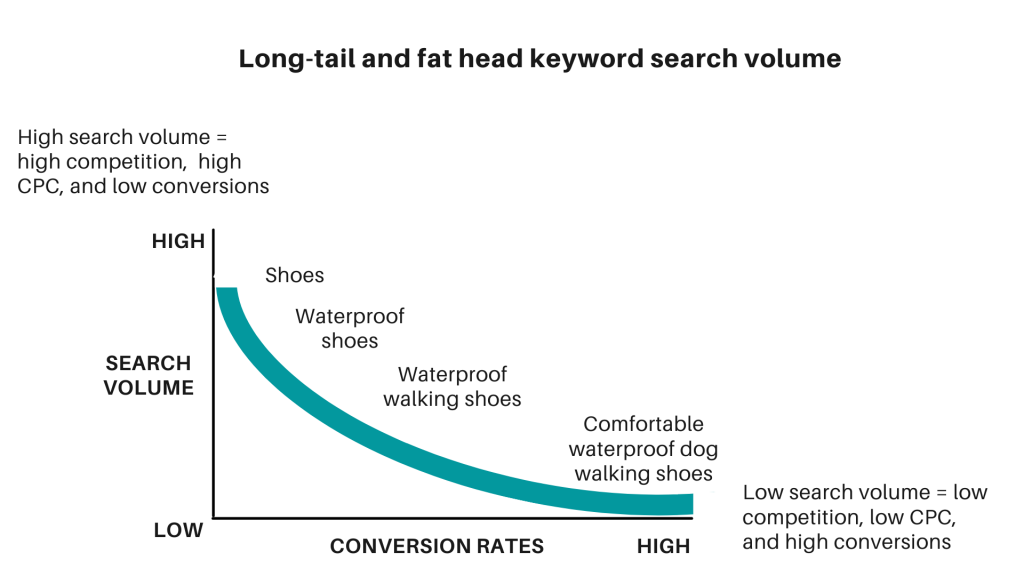21 Conducting Keyword Research
Each search engine requires the advertiser to enter the keywords for which their advertisement should appear. This list of keywords determines the search queries for which the advertisements could appear.
How to conduct keyword research
One of the best ways to begin your research is to record your own search for yourself. Make lists of the different keywords that you would use to find something. Putting yourself in the shoes (or mind) of a searcher is the best way to identify the most relevant keywords. Consider the keyword phrases – string of words – a searcher might use to find your products or services. You should also make note of what Google auto-fills when you type in a search phrase; this gives you insight as to the most common words that are used together when a search is initiated. Conducting keyword research is also an important first step: who is currently advertising on the keywords you plan to bid on? Go ahead, Google it!
These are the most important considerations when it comes to conducting keyword research:
5 Tips for Choosing the Right Keywords in Google AdWords
Long-tail & fat head keywords
There are two categories of keywords when it comes to search: long-tail and fat head. Long-tail keywords are more specific and detailed and may give a clearer picture of the searcher’s intent. Fat head keywords are more general and more often used in search which means they bring in more traffic.

Google has estimated that 50 percent of searches are unique. This means that the sum of unique searches is about the same as the sum of non-unique searches. Looking a little more closely at search terms will show a small number of high-volume searches, and then a large number of lower volume searches stretching out to those unique searches.
In the long tail, the sum of the low-volume searches matches the high-volume searches. This is sometimes referred to as the long tail of search. Figuring out those low-volume, niche search terms can do wonders for a PPC campaign. Generally there is not much competition for those search terms, and the search term itself is very targeted.
Keyword varieties
Google AdWords uses the following match types:
- Broad match
- Phrase match
- Exact match
- Negative match
Depending on the match type, your advertisement can appear for more or fewer keywords.
Broad match means that your advertisement will appear for the keywords you have entered, as well as search terms that contain your keywords and any other words in any order, as well as some variations of your keywords (misspellings and synonyms).
Say you have chosen the following keywords, and this is set to broad match:
- tennis shoes
Your advertisement could appear for all the following searches:
- tennis shoes
- red tennis shoes
- tennis sneaker
- history of tennis shoes
Phrase match, which is denoted with quotation marks around the keywords (“phrase match”) means that your advertisement will appear only for search terms that have your keywords in them, in the same order, though other words may also be in the search term.
If you changed the same keywords to phrase match, they would look like the following:
- “tennis shoes”
Your advertisement would appear for the following:
- tennis shoes
- tennis shoes red
But your advertisement would not appear for the following:
- smart shoes red
Exact match, denoted by square brackets ([exact match]), means that the advertisement will only appear for search terms exactly the same as the keywords selected.
Now change the keyword to exact match:
- [tennis shoes]
Your advertisement will appear for searches for the following:
- tennis shoes
It would not appear for any other searches.
Negative match, denoted by using a dash in front of the keywords (-negative), means that your advertisement will not appear in searches using that word, no matter what other words are used.
Use the broad match example, and include a negative match:
- red shoes
- -tennis
Your advertisement would appear for the following:
- red shoes
- smart shoes red
Your advertisement would not appear for the following:
- red tennis shoes
Advertisers can assign as many keywords as they wish to an advertisement, but only one advertisement for each URL will be shown. If two advertisers are bidding to show advertisements for the same domain, only one will be shown. Which advertisement will be shown is based on the bids being placed and on the quality of the advertisements.
5 Pillars of Google AdWords Success
Text Attribution
- The content on this page except for the images and examples are adapted from eMarketing: The Essential Guide to Online Marketing by Rob Stokes and Saylor Academy which is licensed under a CC BY-NC-SA 4.0 International License.

